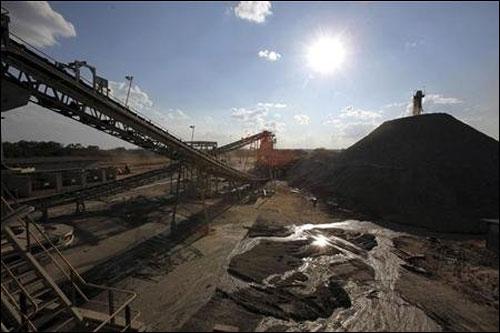
India's mining sector, mired in controversies for a large part of 2012, is set for a cleanup in 2013. While the controversies related to the allocation, production and pricing of minerals could cause minor delays in projects, experts feel the corrective measures underway will help boost investor confidence and spur growth in the sector.
Domestic industry is dependent on the mining sector for key raw materials such as coal and iron ore.
Among the initiatives the government has taken to cleanse the sector are the new norms for auctioning mining blocks aimed at ensuring transparency in allocation, the revised fuel supply agreements (FSAs) to ensure assured coal supply for fuel-starved power plants, and the shift in gross calorific value (GCV)-based grading of coal, which will align domestic prices with international benchmarks.
Union Coal Minister Sriprakash Jaiswal recently told Business Standard that all pending fuel supply pacts would be signed soon. "There will be no discrimination in the new agreements," he said.
Two crucial legislative changes, one for setting up a Coal Regulatory Authority and the other for amending the Mines and Minerals (Development and Regulation) Act, set to be passed in 2013, will further improve regulation.
The coal ministry has identified 54 blocks for auctioning and is currently framing the blueprint for auction. In the first round, the ministry is likely to put 12 explored blocks for bidding. The ministry is also considering a proposal to allow discounts on valuation of coal reserves for power companies, which will in turn keep power tariffs under check. The first round of bidding is expected to begin in a month's time.
Things are not rosy on the supply front, though. Talks between Coal India (CIL) and power companies have been inconclusive, primarily on the issue of who will bear the higher cost of imports. The only solace is that consensus is likely on another proposal, on "price pooling". In this, the higher costs will be shared by all users.
There will be more clarity on pricing once the regulatory authority is set up. The regulator is proposed to have the power to decide the methodology to fix prices, though the prices will be set by the CIL board. The arrangement will allow BSE-listed CIL to decide prices, allowing the extant government control on pricing decisions to continue.
The next year will ring in some clarity on the important issue of coal pricing, which led to a lot of consternation last year. In 2012, CIL's stakeholders opposed government intervention in coal pricing. Further, the government's decision to allocate reserves without pricing them led to the historic coal scam.
The coal allocation scam came to light in March 2012 after draft report of the Comptroller and Auditor General of India (CAG) was leaked to the media. According to the draft CAG report, the government had extended undue benefits to the tune of Rs 10.6 lakh crore to private companies by not auctioning coal reserves. In its final report tabled in Parliament in August, however, the CAG noted a notional loss of only Rs 1.86 lakh crore.
As the scam assumed gargantuan proportions due to intense media coverage, in which the names of many politicians with stakes in allocated coal blocks surfaced, Prime Minister Manmohan Singh had to issue a clarification in Parliament. The Central Bureau of Investigation, too, registered cases against several companies for grabbing blocks based on fraud documentations.
To improve its tarnished image, the government worked out a blueprint for auctioning of blocks. To correct the policy anomalies, the new policy would put a price to mining rights for even government-controlled CIL. The coal ministry would charge CIL a "reserve price" for the 116 coal blocks allotted to the state-owned miner. The coal allocation regime also requires captive mining companies to mandatorily participate in tariff-based bidding for power projects.
Meanwhile, a similar overhaul is underway in the iron ore sector, which is a key input in steel making. If the illegal mining controversy was limited to Karnataka in 2011, year 2012 saw it expanding to other states as well. Year 2013 may be better off, thanks to a Supreme Court's probe panel insisting on putting a rehabilitation scheme in place before mining is resumed. Already, Karnataka's mining mess has eased out after the apex court allowed auctioning of the ore to meet the immediate needs of the local steel makers.
Also, the illegalities that have brought down mining operations in Goa and Orissa are being curbed by the new mining Bill, which is likely to be approved by Parliament in 2013. All eyes are now on the mechanism the government will adopt for auctioning in 2013. While a higher floor price for bidding of reserves will drive away investors, a lower floor price will deprive the government of revenue and fuel allegations of corruption.
Experts, however, are of the view the real reform in the mining sector is unlikely soon. "We can have auctioning of coal blocks thinking it will bring transparency in the process, but bidding is not likely to be successful as most of the blocks are not explored. The situation of uncertainty will not improve until the coal sector is opened up for independent mining by the private sector," said Dipesh Dipu, partner at energy-focused consulting firm Jenisse Management Consultant.